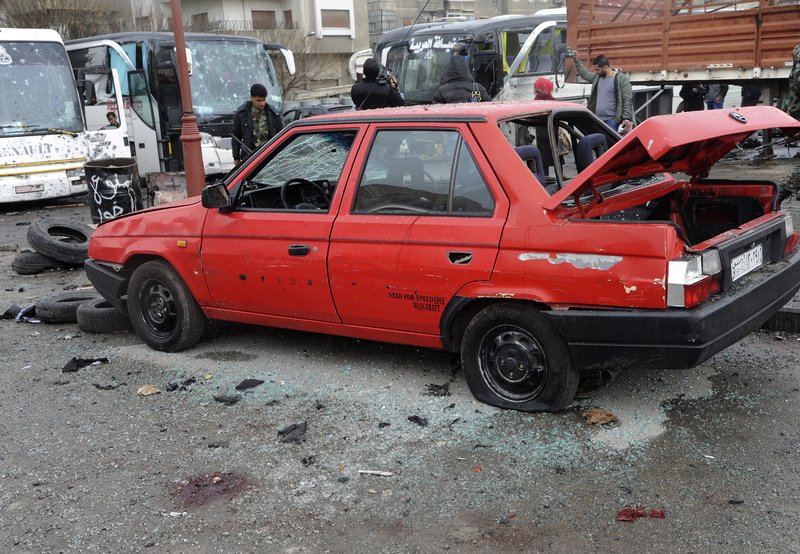BEIRUT -- An al-Qaida-linked group on Sunday claimed responsibility for two blasts that killed at least 40 people Saturday near holy shrines frequented by Shiites in the Syrian capital of Damascus.
The claim came on the same day that activists reported a suspected airstrike by the U.S.-led coalition that killed at least 17 people in northern Syria.
The Levant Liberation Committee said in a statement that the Damascus attacks were carried out by two of its suicide attackers, claiming that they targeted pro-Iranian and pro-government militiamen.
It identified the suicide attackers as Abu Omar and Abu Aisha.
The Syrian government maintains that the attacks killed 40 people. However, the Britain-based Syrian Observatory for Human Rights on Sunday increased its estimated death toll to 74.
Conflicting casualty estimates are common in the aftermath of violence in Syria.
The attacks in Damascus show that Syrian militant groups can still strike deep inside the capital where security is tight, with scores of checkpoints where authorities search cars and ask people for identity cards.
The claim of responsibility comes at a time when al-Qaida's branch in Syria, known as Jabhat Fatah al-Sham, is trying to market itself as the only effective force against Syrian President Bashar Assad and as the main defender of the country's majority Sunnis.
Jabhat Fatah al-Sham opposes peace talks between the opposition and the government that have taken place recently in Geneva and in the Kazakh capital of Astana.
Jabhat Fatah al-Sham, as well as the Islamic State militant group, has been excluded from a cease-fire brokered by Russia and Turkey that went into effect Dec. 30.
Saturday's attacks also wounded more than 100 people, most of them Iraqis, according to Syrian and Iraqi officials.
The al-Qaida-linked group said the blasts were a message to Iran -- a main backer of Assad in Syria's civil war.
"Iran and its militias have, from the start of the revolution, supported the tyrannical and criminal regime and have been killing and displacing our people," the statement said.
The Levant Liberation Committee is a coalition of several militant groups dominated by Jabhat Fatah al-Sham.
Members of the same group stormed two different security offices in the central city of Homs two weeks ago, killing and wounding scores of people, including a top Syrian security official.
Elsewhere on Sunday, opposition activists in northern Syria said a suspected U.S.-led coalition airstrike hit a school in the village of Kasrat just south of the city of Raqqa, killing at least 17 people.
The airstrike came amid an offensive by U.S.-backed, Kurdish-led fighters against the Islamic State group in the northern Raqqa province.
The city of Raqqa is the extremists' self-declared capital.
The Observatory said Sunday's airstrike killed 19 people, including eight people who had previously fled violence in the nearby province of Aleppo.
The activist group Raqqa is Being Slaughtered Silently said the airstrike killed 17 people.
On Thursday, at least 20 civilians, including some children, were killed in suspected coalition airstrikes on a village east of Raqqa.
Also Sunday, two Syrian opposition figures said the rebels will not take part in a Tuesday meeting in Astana that was planned and sponsored by Russia and Turkey, saying the Syrian government has not been abiding by the cease-fire.
Ahmad Ramadan said via a text message that rebels will not go because the Syrian government and Russia are working to displace people from the neighborhood of al-Waer, the only rebel-held area in Homs.
Rebel legal adviser and spokesman Osama Abo Zayd wrote on his Twitter account that "the crimes by the regime and Iran, and the shelling and airstrikes of Russia and its sponsoring of displacement in al-Waer has totally severed the opportunities of our participation in Astana."
The announcements came a day after Syria's armed opposition groups called for postponing the meeting in Astana, saying that violations of the cease-fire have persisted.
A Section on 03/13/2017

